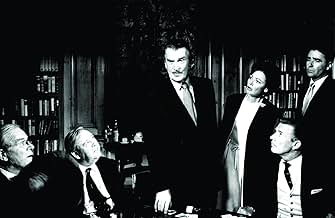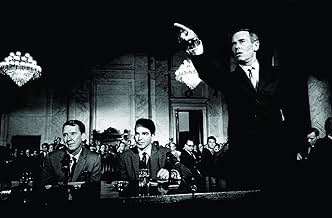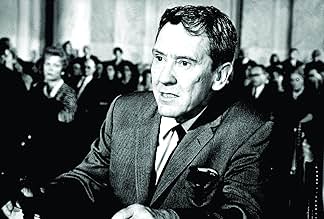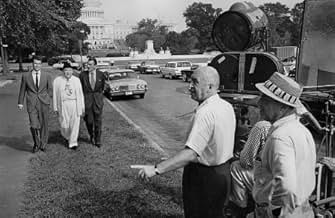Als der US-Senat einen für den Posten des Außenministers vorgeschlagenen Kandidaten überprüft, kommt ein Geheimnis aus der Vergangenheit ans Licht, das nicht nur den Kandidaten, sondern auch... Alles lesenAls der US-Senat einen für den Posten des Außenministers vorgeschlagenen Kandidaten überprüft, kommt ein Geheimnis aus der Vergangenheit ans Licht, das nicht nur den Kandidaten, sondern auch den Ruf des Präsidenten ruinieren kann.Als der US-Senat einen für den Posten des Außenministers vorgeschlagenen Kandidaten überprüft, kommt ein Geheimnis aus der Vergangenheit ans Licht, das nicht nur den Kandidaten, sondern auch den Ruf des Präsidenten ruinieren kann.
- Nominiert für 1 BAFTA Award
- 1 Gewinn & 2 Nominierungen insgesamt
Empfohlene Bewertungen
It was the first film in seven years for Gene Tierney and the last for Charles Laughton. Tierney couldn't have chosen a better comeback and Laughton a more fitting farewell.
It's up to the majority leader, Bob Munson (Walter Pidgeon) to get the President's (Franchot Tone) nominee for Secretary of State (Henry Fonda) confirmed, but it's not going to be easy.
Senator Cooley from South Carolina (Laughton) believes that Robert Leffingwell once had Communist ties and doesn't want him confirmed, even if it means digging up marginal people (Burgess Meredith) who claim to have known Comrade Leffingwell.
An ambitious, aggressive young senator (George Grizzard) loudly wants Leffingwell approved, and he will do anything to make it happen - even if it means blackmailing the chairman of the hearing, Brig Anderson (Don Murray).
There is pressure on the President to withdraw Leffingwell, and he refuses; the President puts pressure on Anderson to get him confirmed, and, sticking to his own principles, Brig, despite a tremendous threat to his home and political position, refuses to reconvene the hearing.
Meanwhile, if Leffingwell stays in and there's a tie, it will be up to the Vice President (Lew Ayres) as the President of the Senate, to break it.
This is a brilliantly done film that has you glued from the first moment to the last. It not only gives a vivid portrait of politics and how the Senate works but keeps the viewer in suspense for the entire movie.
The acting is magnificent. Franchot Tone gives a sturdy performance as a President running out of time; Lew Ayres underplays and makes sympathetic the role of the compromise Vice President; Walter Pidgeon is elegant and authoritative as the majority leader; Henry Fonda gives a straightforward, honest portrayal of a man who wants to serve his country but has to go against some of his own beliefs in order to do it.
There isn't a wrong note throughout, even down to a very young and pretty Betty White who has a tiny role as a Senator and Peter Lawford as a Jack Kennedy type.
Inga Swenson is the insecure Mrs. Anderson and gives a heartbreaking performance as a loving wife who feels she has failed her husband in some fundamental way.
Laughton is great, but he is given some very florid dialogue, and he rises to the occasion by hamming it up. It was an appropriate choice given the script.
Gene Tierney, as a wealthy widow/hostess who sees Pidgeon on the side, looks beautiful and gives a charming performance.
The end of this movie is incredibly powerful, and the scene with the President, Vice President and Senate Majority leader Munson is one of my favorites for a special reason.
In the book, the Vice President, who is terribly worried about the President's health, has an encounter with the President and then goes back to his office and expresses some emotion about the meeting.
Though the scene isn't in the film, Lew Ayres obviously read the book and has the same emotional reaction, but unspoken, on the Destroyer. Unless you've read the book, you won't pick it up, but it's an even greater scene if you have.
IMDb members have posted that nothing has changed today. In politics, I'm sure that is true. In films, unfortunately, things have changed.
A character-driven film rich in dialogue like "Advise and Consent" is hard to come by. See it and revel in the film-making past and shake your head at the timeliness of the story.
It was also a book that Hollywood could not film under the film industry's notorious Production Code. As it happened, the book fell into the hands of director Otto Preminger, long-time foe of Hollywood's rules for self-censorship. He not only made the film, he flagrantly broke the code; as such, ADVISE AND CONSENT presents our nation's leaders embroiled in a blackmail plot, finds actress Gene Tierney using the word 'bitch,' and became the first Hollywood film to show a gay bar. It was shocking stuff for 1962.
The story is extremely convoluted. An aging and extremely ill President makes a highly controversial nomination for Secretary of State---which is opposed by a member of his own party, who bears the nominee a personal grudge and who attempts to derail the nomination by accusing the nominee of former membership in the Communist Party. This in turn touches off a vicious battle between those in the party who support the nominee and those who don't, a battle that will ultimately result in the suicide of the only character who has the integrity we would like to see in our political leaders.
The cast is indeed remarkable and, from Lew Ayres to Betty White, plays with considerable conviction and tremendous restraint. Henry Fonda is often cited as the star of the film, but in truth he appears in the small but pivotal role of Robert Leffingwell, nominee for Secretary of State. Screen time is divided between Walter Pigeon as the Majority Leader, Charles Laughton as the senator who opposes the nomination, and Don Murray, an idealist who finds himself chairing the nomination committee. All three play extremely well, but it is really Laughton---in his final screen role---who walks off with the film as the devious and openly vicious Senator from South Carolina. The trio is ably supported by a dream cast that includes Franchot Tone as the President, Lew Ayres as the Vice President, George Grizzard as a growling ideologue, Gene Tierney as a society hostess---and yes, Betty White, who offers a brief turn as the Senator from Kansas.
It has become fashionable to dismiss Otto Preminger films of the 1950s and 1960s as ponderous, all-star, and pseudo-intellectual trash, and indeed it is difficult to find much positive to say about films like EXODUS and HURRY SUNDOWN these days. But Preminger is in many ways under-rated; his films have not always dated well in terms of subject, but they hold up extremely well in the way in which they are put together, with ADVISE AND CONSENT a case in point---and it is worth pointing out that accusations of leftism, adultery, and homosexuality are still enough to prompt everything from impeachment to congressional hearings to resignations. Nor has the process of the political dance itself changed greatly between then and now.
The great flaw of the film is its conclusion, which seems facile to the point of being hokey---but this is also the great flaw of the novel, which ends in much the same way--and at times ADVISE AND CONSENT seems more than a little dry. All the same, it remains a movie worth watching, particularly notable for its performances, fluid camera work, and meticulous recreation of party politics. The DVD offers a near-pristine widescreen transfer with good sound quality and an interesting, if occasionally too academic, commentary by film historian Drew Casper. Recommended.
GFT, Amazon Reviewer
It really has aged very well, and is, obviously, at least as relevant today as it was in 1962 --"realistic" in its depiction of the congressional situation in its own day, positively prescient in its relation to our own.
Fonda is good, but curiously second fiddle to the other, more subtle characters.
It's Walter Pigeon's best flick (by far), well cast as the Senate Majority Leader and he carries the role off with an almost Shakespearean aplomb.
Almost Charles Laughton's best (only because that's a very hard call), with his hopelessly crumpled white suit and hat, shufflin' gait, positively Irvinesque homespun witticisms and wonderful, drawling, contemptuous "Mis-ter Rob-ert A. Leff-in-well".
Might be Franchot Tone's best, as well, as the ailing, frail, chain-smoking president, a little bit too close to Life (filmed 6 years before he died of lung cancer).
Gene Tierney is very good as the D.C. socialite hostess "Dolly Harrison" --a character clearly based on Averill Harriman's wife Pamela or, as a type, a later Katherine Graham.
Definitely Peter Lawford's best film --which, admittedly, is not saying much, but he's very well cast as a rather dissolute, philandering Kennedyesque senator who is, nonetheless, not without his Qualities.
Lew Ayres' Casper Milquetoast "Vice President Harley M. Hudson" is an excellently wrought character, from his "bucket of warm spit" role as the impotent President of the Senate to the wonderful twist he gives it at the end, which expounds quite beautifully the subtleties and definitiveness of the Reality of Power.
The scenes of D.C. are positively nostalgic --imagine anyone being able to catch a cab to the capital and then walk right up the steps and go inside ; or an aged night-watchman making his rounds as *the* Security for the inside of the Senate building.
As are the various aspects of the underground "Gay Scene" in NYC with the wonderfully cast Larry Tucker, Jerry Fielding's fine music and "the voice of Frank Sinatra" (as credited). (Some might object to the "clichés" in these scenes, but, to me, those clichés are part and parcel of the ambiance of the period of the film and the culture it portrays and should be seen as such --rather like appreciating the overt racism in "Birth of a Nation" for what it is. I am glad that Preminger didn't "sanitize" his presentation of this matter, especially given the crucial nature of it to the plot of the film.)
But the contrast between the civility --albeit occasionally a rather raw one-- of the senate of circa 1960 and that of the present day is not nostalgic quite so much as it is just heart-rending ("The World We Have Lost"), and the roots of our present grotesque, take-no-prisoners congressional savagery are fully exposed in the intertwined plot lines of McCarthyesque ideological rigidity and homosexual blackmail.
All in all, a "Roman à Clef" to the political world of 1960's Washington, vividly relevant to our own time.
A moving look at a fictional moment in American politics. We see the dirty deals behind the scenes, but also that dignity and wisdom is preserved by some of the men (and one woman, shown). And we see the power of the system, the value of begrudging respect for those with opposite views, and plain old simplicity of being on the Senate floor and making points, orally, in front of a bunch of others, some of them actually listening.
Reminds me of my classrooms, and that brings government down to a level of believability. That's the secret to the movie, overall, it's ability to make the people real, including a host of really great actors like Charles Laughton and Walter Pidgeon, and of course Henry Fonda, who has a smaller role. Franchot Tone makes a believable ailing president, and it's great to see Gene Tierney in 1962, perfectly cast as a cool, smiley Senator's wife.
Otto Preminger is one of those revered directors who was always tweaking the moral edges of Hollywood, and therefore of America, and the spectacular thread that rises as the movie goes along, of a homosexual subculture existing at all in 1962, and arising from the activity of soldiers, and penetrating the Senate directly, was weirdly controversial stuff. Of course, it's almost ridiculous now, but it wasn't then, and to hear the central senator refer to another senator's gay military experience as a "tired old sin" is hard stuff for those of use who have grown up thinking "each to their own," or even "don't ask don't tell."
Preminger also irked a few anti-Communists by using a couple of left-wing actors, including Burgess Meredith, who has a small but memorable role. And the whole notion of a potential Secretary of State once having been superficially involved in a "Communist cell block" is interesting here partly because it shows how silly accusations can be, attacking things you do when you're twenty and have fully rejected or outgrown. Fonda is that figure of utter respectability for the good reason that he represents utter morality and patriotism, without become a cardboard flag-waver.
Though released to a public well into the Kennedy era, it feels like an Eisenhower world, with a couple younger senators easily looking like the Kennedy type, but still not President. The belligerent Old South conservative is, tellingly, a Democrat, back in the days when the South was pretty much conservative democratic. There are no parties mentioned, actually, but the leading voices seem to be liberal in their foreign policy, more like the Kennedy tone (or from the 50s, the tone of Adlai Stevenson, who lost the nomination bid to Kennedy in 1960). The book that led to the movie, by Allen Drury, was finished in 1959, and Drury was a bit of a right-winger, critical of the media he was part of, and openly anti-Communist. The events in the story (book and movie both) take one notable liberty: the Senator with a "homosexual scandal" in his past was Lester Hunt of Wyoming, whose son was a homosexual. That was enough to make the father a blackmail target, leading to Hunt's suicide.
That none of this matters is tribute to the movie, which really captures 1950s style American politics in a bright, Hollywood way. I mean that positively. It's not a gritty documentary, and it doesn't make scandal out of everything. But the air is familiar, the tone, the looks, the clothes. And it is supremely well done, from the dignified camera-work (nothing film noir here) to the solid editing and storytelling, to of course the acting itself. Not exciting, but very involving and interesting.
Wusstest du schon
- WissenswertesDirector Otto Preminger offered the role of a Southern senator to Martin Luther King Jr., believing that the casting could have a positive impact (despite the fact that there were no black senators at the time). King declined after serious consideration, as he felt playing the role could cause hostility and hurt the civil rights movement.
- PatzerWhen the roll call vote is being conducted on the motion to advise and consent to Leffingwell's nomination, Senator Van Ackerman's name is not called. Even though he had left the Senate Chamber, the clerk would still have called his name.
- Zitate
Johnny Leffingwell: The phone - Senator Munson.
Robert Leffingwell: Tell him I've gone out.
Johnny Leffingwell: Why?
Robert Leffingwell: Because, Johnny, he'll want to do some things that might obligate me.
Johnny Leffingwell: I mean why do you want me to lie? If you're in, you're in; if you're out, you're out.
Robert Leffingwell: Son, this is a Washington, D.C. kind of lie. It's when the other person knows you're lying, and also knows you *know* he knows. You follow?
- Alternative VersionenAlso available in a computer colorized version.
- VerbindungenFeatured in Henry Fonda: The Man and His Movies (1982)
- SoundtracksThe Song from Advise and Consent
Music by Jerry Fielding
Lyrics by Ned Washington
Sung Frank Sinatra - voice on juke box
Top-Auswahl
- How long is Advise & Consent?Powered by Alexa
- Chicago Opening Happened When?
- J. Edward McKinley---Was He Related to a U.S. President?
Details
- Erscheinungsdatum
- Herkunftsland
- Offizieller Standort
- Sprache
- Auch bekannt als
- Advise & Consent
- Drehorte
- Columbia/Sunset Gower Studios - 1438 N. Gower Street, Hollywood, Los Angeles, Kalifornien, USA(Studio, Senate Chamber - interiors)
- Produktionsfirmen
- Weitere beteiligte Unternehmen bei IMDbPro anzeigen
- Laufzeit2 Stunden 19 Minuten
- Farbe
- Seitenverhältnis
- 2.35 : 1
Zu dieser Seite beitragen







































